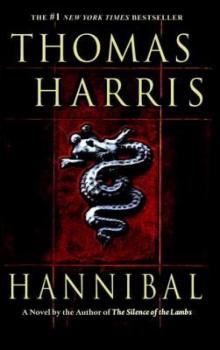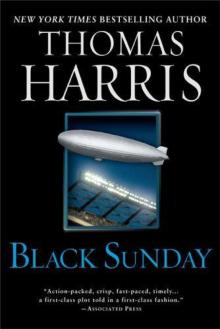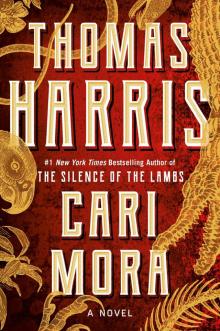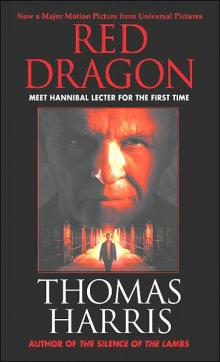- Home
- Thomas Harris
The Silence of the Lambs (Hannibal Lecter) Page 3
The Silence of the Lambs (Hannibal Lecter) Read online
Page 3
“Now,” Lecter said, sitting sideways at his table to face her, “what did Miggs say to you?”
“Who?”
“Multiple Miggs, in the cell down there. He hissed at you. What did he say?”
“He said, ‘I can smell your cunt.’”
“I see. I myself cannot. You use Evyan skin cream, and sometimes you wear L’Air du Temps, but not today. Today you are determinedly unperfumed. How do you feel about what Miggs said?”
“He’s hostile for reasons I couldn’t know. It’s too bad. He’s hostile to people, people are hostile to him. It’s a loop.”
“Are you hostile to him?”
“I’m sorry he’s disturbed. Beyond that, he’s noise. How did you know about the perfume?”
“A puff from your bag when you got out your card. Your bag is lovely.”
“Thank you.”
“You brought your best bag, didn’t you?”
“Yes.” It was true. She had saved for the classic casual handbag, and it was the best item she owned.
“It’s much better than your shoes.”
“Maybe they’ll catch up.”
“I have no doubt of it.”
“Did you do the drawings on your walls, Doctor?”
“Do you think I called in a decorator?”
“The one over the sink is a European city?”
“It’s Florence. That’s the Palazzo Vecchio and the Duomo, seen from the Belvedere.”
“Did you do it from memory, all the detail?”
“Memory, Officer Starling, is what I have instead of a view.”
“The other one is a crucifixion? The middle cross is empty.”
“It’s Golgotha after the Deposition. Crayon and Magic Marker on butcher paper. It’s what the thief who had been promised Paradise really got, when they took the paschal lamb away.”
“And what was that?”
“His legs broken of course, just like his companion who mocked Christ. Are you entirely innocent of the Gospel of St. John? Look at Duccio, then—he paints accurate crucifixions. How is Will Graham? How does he look?”
“I don’t know Will Graham.”
“You know who he is. Jack Crawford’s protégé. The one before you. How does his face look?”
“I’ve never seen him.”
“This is called ‘cutting up a few old touches,’ Officer Starling, you don’t mind do you?”
Beats of silence and she plunged.
“Better than that, we could touch up a few old cuts here. I brought—”
“No. No, that’s stupid and wrong. Never use wit in a segue. Listen, understanding a witticism and replying to it makes your subject perform a fast, detached scan that is inimical to mood. It is on the plank of mood that we proceed. You were doing fine, you’d been courteous and receptive to courtesy, you’d established trust by telling the embarrassing truth about Miggs, and then you come in with a ham-handed segue into your questionnaire. It won’t do.”
“Dr. Lecter, you’re an experienced clinical psychiatrist. Do you think I’m dumb enough to try to run some kind of mood scam on you? Give me some credit. I’m asking you to respond to the questionnaire, and you will or you won’t. Would it hurt to look at the thing?”
“Officer Starling, have you read any of the papers coming out of Behavioral Science recently?”
“Yes.”
“So have I. The FBI stupidly refuses to send me the Law Enforcement Bulletin, but I get it from secondhand dealers and I have the News from John Jay, and the psychiatric journals. They’re dividing the people who practice serial murder into two groups—organized and disorganized. What do you think of that?”
“It’s … fundamental, they evidently—”
“Simplistic is the word you want. In fact, most psychology is puerile, Officer Starling, and that practiced in Behavioral Science is on a level with phrenology. Psychology doesn’t get very good material to start with. Go to any college psychology department and look at the students and faculty: ham radio enthusiasts and other personality-deficient buffs. Hardly the best brains on the campus. Organized and disorganized—a real bottom-feeder thought of that.”
“How would you change the classification?”
“I wouldn’t.”
“Speaking of publications, I read your pieces on surgical addiction and left-side, right-side facial displays.”
“Yes, they were first-rate,” Dr. Lecter said.
“I thought so, and so did Jack Crawford. He pointed them out to me. That’s one reason he’s anxious for you—”
“Crawford the Stoic is anxious? He must be busy if he’s recruiting help from the student body.”
“He is, and he wants—”
“Busy with Buffalo Bill.”
“I expect so.”
“No. Not ‘I expect so.’ Officer Starling, you know perfectly well it’s Buffalo Bill. I thought Jack Crawford might have sent you to ask me about that.”
“No.”
“Then you’re not working around to it.”
“No, I came because we need your—”
“What do you know about Buffalo Bill?”
“Nobody knows much.”
“Has everything been in the papers?”
“I think so. Dr. Lecter, I haven’t seen any confidential material on that case, my job is—”
“How many women has Buffalo Bill used?”
“The police have found five.”
“All flayed?”
“Partially, yes.”
“The papers have never explained his name. Do you know why he’s called Buffalo Bill?”
“Yes.”
“Tell me.”
“I’ll tell you if you’ll look at this questionnaire.”
“I’ll look, that’s all. Now, why?”
“It started as a bad joke in Kansas City homicide.”
“Yes…?”
“They call him Buffalo Bill because he skins his humps.”
Starling discovered that she had traded feeling frightened for feeling cheap. Of the two, she preferred feeling frightened.
“Send through the questionnaire.”
Starling rolled the blue section through on the tray. She sat still while Lecter flipped through it.
He dropped it back in the carrier. “Oh, Officer Starling, do you think you can dissect me with this blunt little tool?”
“No. I think you can provide some insight and advance this study.”
“And what possible reason could I have to do that?”
“Curiosity.”
“About what?”
“About why you’re here. About what happened to you.”
“Nothing happened to me, Officer Starling. I happened. You can’t reduce me to a set of influences. You’ve given up good and evil for behaviorism, Officer Starling. You’ve got everybody in moral dignity pants—nothing is ever anybody’s fault. Look at me, Officer Starling. Can you stand to say I’m evil? Am I evil, Officer Starling?”
“I think you’ve been destructive. For me it’s the same thing.”
“Evil’s just destructive? Then storms are evil, if it’s that simple. And we have fire, and then there’s hail. Underwriters lump it all under ‘Acts of God.’”
“Deliberate—”
“I collect church collapses, recreationally. Did you see the recent one in Sicily? Marvelous! The façade fell on sixty-five grandmothers at a special Mass. Was that evil? If so, who did it? If He’s up there, He just loves it, Officer Starling. Typhoid and swans—it all comes from the same place.”
“I can’t explain you, Doctor, but I know who can.”
He stopped her with his upraised hand. The hand was shapely, she noted, and the middle finger perfectly replicated. It is the rarest form of polydactyly.
When he spoke again, his tone was soft and pleasant. “You’d like to quantify me, Officer Starling. You’re so ambitious, aren’t you? Do you know what you look like to me, with your good bag and your cheap shoes? You look like a rube. You
’re a well-scrubbed, hustling rube with a little taste. Your eyes are like cheap birthstones—all surface shine when you stalk some little answer. And you’re bright behind them, aren’t you? Desperate not to be like your mother. Good nutrition has given you some length of bone, but you’re not more than one generation out of the mines, Officer Starling. Is it the West Virginia Starlings or the Okie Starlings, Officer? It was a toss-up between college and the opportunities in the Women’s Army Corps, wasn’t it? Let me tell you something specific about yourself, Student Starling. Back in your room, you have a string of gold add-a-beads and you feel an ugly little thump when you look at how tacky they are now, isn’t that so? All those tedious thank-yous, permitting all that sincere fumbling, getting all sticky once for every bead. Tedious. Tedious. Bo-o-o-o-r-i-ing. Being smart spoils a lot of things, doesn’t it? And taste isn’t kind. When you think about this conversation, you’ll remember the dumb animal hurt in his face when you got rid of him.
“If the add-a-beads got tacky, what else will as you go along? You wonder don’t you, at night?” Dr. Lecter asked in the kindest of tones.
Starling raised her head to face him. “You see a lot, Dr. Lecter. I won’t deny anything you’ve said. But here’s the question you’re answering for me right now, whether you mean to or not: Are you strong enough to point that high-powered perception at yourself? It’s hard to face. I’ve found that out in the last few minutes. How about it? Look at yourself and write down the truth. What more fit or complex subject could you find? Or maybe you’re afraid of yourself.”
“You’re tough, aren’t you, Officer Starling?”
“Reasonably so, yes.”
“And you’d hate to think you were common. Wouldn’t that sting? My! Well you’re far from common, Officer Starling. All you have is fear of it. What are your add-a-beads, seven millimeter?”
“Seven.”
“Let me make a suggestion. Get some loose, drilled tiger’s eyes and string them alternately with the gold beads. You might want to do two-and-three or one-and-two, however looks best to you. The tiger’s eyes will pick up the color of your own eyes and the highlights in your hair. Has anyone ever sent you a Valentine?”
“Yep.”
“We’re already into Lent. Valentine’s Day is only a week away, hmmmm, are you expecting some?”
“You never know.”
“No, you never do.… I’ve been thinking about Valentine’s Day. It reminds me of something funny. Now that I think of it, I could make you very happy on Valentine’s Day, Clarice Starling.”
“How, Doctor Lecter?”
“By sending you a wonderful Valentine. I’ll have to think about it. Now please excuse me. Good-bye, Officer Starling.”
“And the study?”
“A census taker tried to quantify me once. I ate his liver with some fava beans and a big Amarone. Go back to school, little Starling.”
Hannibal Lecter, polite to the last, did not give her his back. He stepped backward from the barrier before he turned to his cot again, and lying on it, became as remote from her as a stone crusader lying on a tomb.
Starling felt suddenly empty, as though she had given blood. She took longer than necessary to put the papers back in her briefcase because she didn’t immediately trust her legs. Starling was soaked with the failure she detested. She folded her chair and leaned it against the utility closet door. She would have to pass Miggs again. Barney in the distance appeared to be reading. She could call him to come for her. Damn Miggs. It was no worse than passing construction crews or delivery louts every day in the city. She started back down the corridor.
Close beside her, Miggs’ voice hissed, “I bit my wrist so I can diiiieeeeeeeee—see how it bleeds?”
She should have called Barney but, startled, she looked into the cell, saw Miggs flick his fingers and felt the warm spatter on her cheek and shoulder before she could turn away.
She got away from him, registered that it was semen, not blood, and Lecter was calling to her, she could hear him. Dr. Lecter’s voice behind her, the cutting rasp in it more pronounced.
“Officer Starling.”
He was up and calling after her as she walked. She rummaged in her purse for tissues.
Behind her, “Officer Starling.”
She was on the cold rails of her control now, making steady progress toward the gate.
“Officer Starling.” A new note in Lecter’s voice.
She stopped. What in God’s name do I want this bad? Miggs hissed something she didn’t listen to.
She stood again in front of Lecter’s cell and saw the rare spectacle of the doctor agitated. She knew that he could smell it on her. He could smell everything.
“I would not have had that happen to you. Discourtesy is unspeakably ugly to me.”
It was as though committing murders had purged him of lesser rudeness. Or perhaps, Starling thought, it excited him to see her marked in this particular way. She couldn’t tell. The sparks in his eyes flew into his darkness like fireflies down a cave.
Whatever it is, use it, Jesus! She held up her briefcase. “Please do this for me.”
Maybe she was too late; he was calm again.
“No. But I’ll make you happy that you came. I’ll give you something else. I’ll give you what you love the most, Clarice Starling.”
“What’s that, Dr. Lecter?”
“Advancement, of course. It works out perfectly—I’m so glad. Valentine’s Day made me think of it.” The smile over his small white teeth could have come for any reason. He spoke so softly she could barely hear. “Look in Raspail’s car for your Valentines. Did you hear me? Look in Raspail’s car for your Valentines. You’d better go now; I don’t think Miggs could manage again so soon, even if he is crazy, do you?”
CHAPTER 4
Clarice Starling was excited, depleted, running on her will. Some of the things Lecter had said about her were true, and some only clanged on the truth. For a few seconds she had felt an alien consciousness loose in her head, slapping things off the shelves like a bear in a camper.
She hated what he’d said about her mother and she had to get rid of the anger. This was business.
She sat in her old Pinto across the street from the hospital and breathed deeply. When the windows fogged she had a little privacy from the sidewalk.
Raspail. She remembered the name. He was a patient of Lecter’s and one of his victims. She’d had only one evening with the Lecter background material. The file was vast and Raspail one of many victims. She needed to read the details.
Starling wanted to run with it, but she knew that the urgency was of her own manufacture. The Raspail case was closed years ago. No one was in danger. She had time. Better to be well informed and well advised before she went further.
Crawford might take it away from her and give it to someone else. She’d have to take that chance.
She tried to call him from a phone booth, but found he was budget-begging for the Justice Department before the House Subcommittee on Appropriations.
She could have gotten details of the case from the Baltimore Police Department’s homicide division, but murder is not a federal crime and she knew they’d snatch it away from her immediately, no question.
She drove back to Quantico, back to Behavioral Science with its homey brown-checked curtains and its gray files full of hell. She sat there into the evening, after the last secretary had left, cranking through the Lecter microfilm. The contrary old viewer glowed like a jack-o’-lantern in the darkened room, the words and the negatives of pictures swarming across her intent face.
Raspail, Benjamin René, WM, 46, was first flutist for the Baltimore Philharmonic Orchestra. He was a patient in Dr. Hannibal Lecter’s psychiatric practice.
On March 22, 1975, he failed to appear for a performance in Baltimore. On March 25 his body was discovered seated in a pew in a small rural church near Falls Church, Virginia, dressed only in a white tie and a tailcoat. Autopsy revealed that Raspail’s heart wa
s pierced and that he was short his thymus and pancreas.
Clarice Starling, who from early life had known much more than she wished to know about meat processing, recognized the missing organs as the sweetbreads.
Baltimore Homicide believed that these items appeared on the menu of a dinner Lecter gave for the president and the conductor of the Baltimore Philharmonic on the evening following Raspail’s disappearance.
Dr. Hannibal Lecter professed to know nothing about these matters. The president and the conductor of the Philharmonic testified that they could not recall the fare at Dr. Lecter’s dinner, though Lecter was known for the excellence of his table and had contributed numerous articles to gourmet magazines.
The president of the Philharmonic subsequently was treated for anorexia and problems related to alcohol dependency at a holistic nerve sanitarium in Basel.
Raspail was Lecter’s ninth known victim, according to the Baltimore police.
Raspail died intestate, and the lawsuits among his relatives over the estate were followed by the newspapers for a number of months before public interest flagged.
Raspail’s relatives had also joined with the families of other victims in Lecter’s practice in a successful lawsuit to have the errant psychiatrist’s case files and tapes destroyed. There was no telling what embarrassing secrets he might blab, their reasoning went, and the files were documentation.
The court had appointed Raspail’s lawyer, Everett Yow, to be executor of his estate.
Starling would have to apply to the lawyer to get at the car. The lawyer might be protective of Raspail’s memory and, with enough advance notice, might destroy evidence to cover for his late client.
Starling preferred to pounce, and she needed advice and authorization. She was alone in Behavioral Science and had the run of the place. She found Crawford’s home number in the Rolodex.
She never heard the telephone ringing, but suddenly his voice was there, very quiet and even.
“Jack Crawford.”
“This is Clarice Starling. I hope you weren’t eating dinner.…” She had to continue into silence. “… Lecter told me something about the Raspail case today, I’m in the office following it up. He tells me there’s something in Raspail’s car. I’d have to get at it through his lawyer, and since tomorrow’s Saturday—no school—I wanted to ask you if—”

 The Silence of the Lambs
The Silence of the Lambs Red Dragon
Red Dragon Hannibal
Hannibal Black Sunday
Black Sunday Cari Mora
Cari Mora Hannibal Rising
Hannibal Rising Red Dragon hl-1
Red Dragon hl-1 The Silence of the Lambs (Hannibal Lecter)
The Silence of the Lambs (Hannibal Lecter)